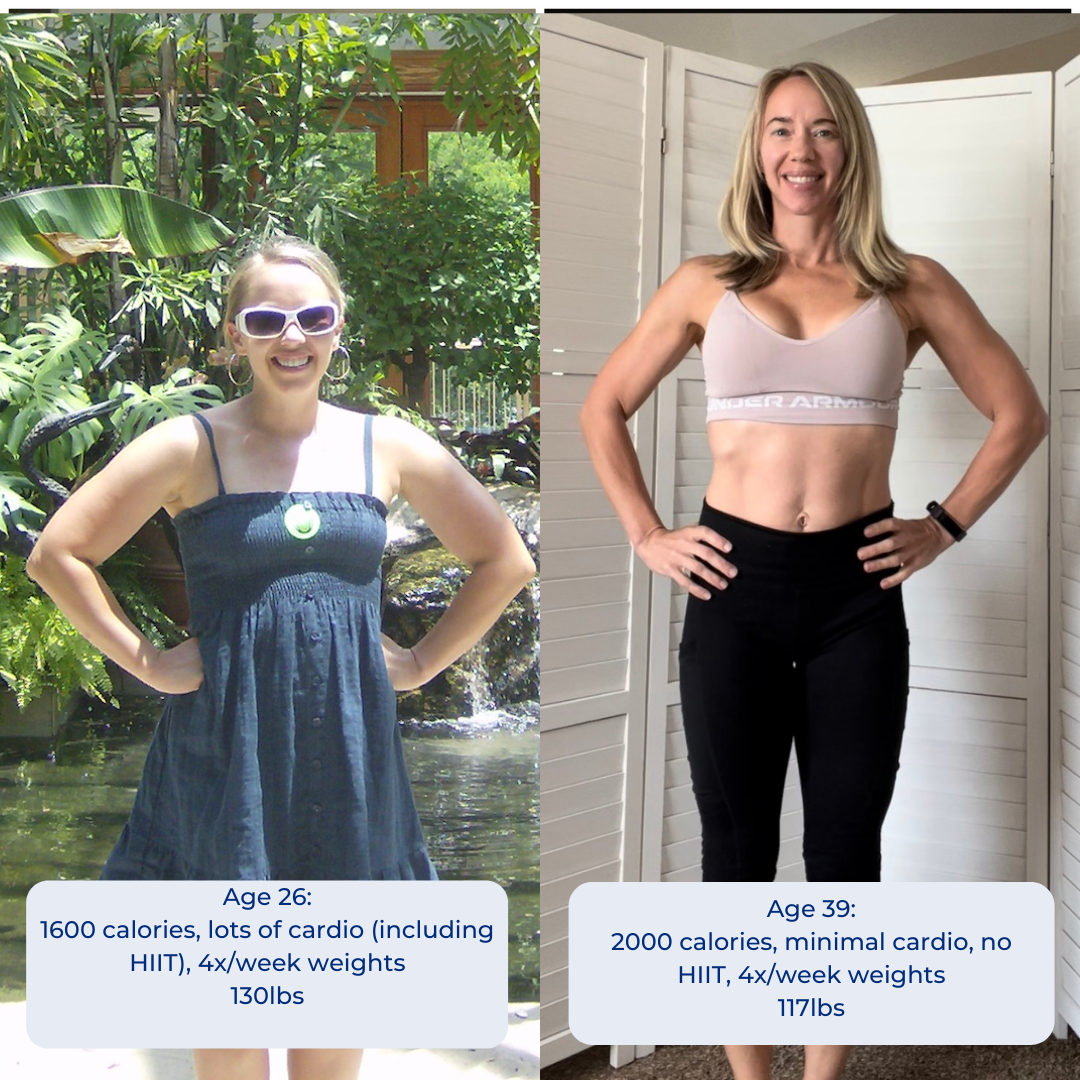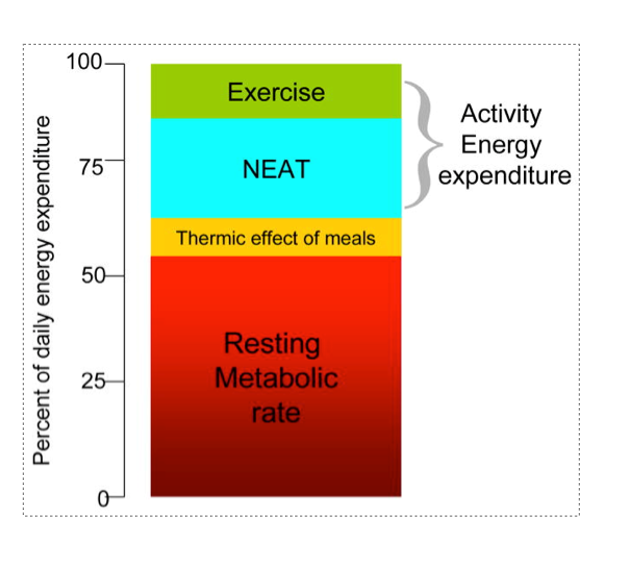How to Boost Metabolism After Age 40
Have you reached a certain age (maybe that’s 30, 35, or 40) and found that you just can’t lose weight as easily as you could in the past? Maybe you’ve blamed your metabolism getting slower on old age and told yourself it's just something you have to deal with now that you are a “certain age”.
Believe it or not, a slower metabolism is not caused simply because you are getting older. A slower metabolism is actually caused by lifestyle choices that, over time, contribute to your metabolism slowing as you continue these habits year after year. Many women (and men) are making choices in their adult life that contribute to their metabolic capacity slowing down, but you can beat the odds by making a few simple lifestyle changes.
Understanding Metabolism and How To Burn Calories
In order to fully understand how to increase your metabolism, it helps to understand the various categories that comprise the calories you burn in a given day. The graphic below does a great job of visually showing where most of your calorie burn comes from. Your basal metabolic rate (BMR) is where the majority of your calorie burn comes from. Your BMR includes the calories you burn simply from living (ex. Breathing, your heart beating, etc.). This is actually something that can adjust higher or lower depending on some lifestyle choices that we will discuss later in this article. The next largest category comes from NEAT (non-exercise activity thermogenesis). Think is your daily activity excluding formal exercise. This might include things like cleaning the house, playing with your children, grocery shopping, etc.
Another category is the thermic effect of food. This is the energy you burn by eating and digesting your food. Finally, one of the smallest categories is formal exercise. This would be what you think of when you think of consciously trying to burn calories (ex. Going for a run, working out at the gym, etc.). Now that you understand the various categories, we will talk about how these can change depending on the lifestyle choices you make.
Does Metabolism Slow With Age?
As we mentioned above, your metabolism does not slow down simply because you age. Some of the main contributing factors to a slower metabolism are loss of muscle mass, becoming more sedentary, and the body adapting to fewer calories. We will talk about each of these in detail.
Slow Metabolism Causes
Loss of Muscle Mass
As a female, you will lose, on average, 3-8% of your muscle mass per decade after age 30 if you are not performing weight-bearing exercises. In today’s world, unless we have an active job that involves lifting heavy objects, we get very little weight-bearing activity in our everyday lives. If you are not purposefully incorporating weight-bearing activity into your daily routine, you will start to lose muscle mass after the age of 30. This, in turn, will cause your metabolic rate to slow down. Muscle burns, on average, 10 calories per day per pound. In turn, fat only burns 2-3 calories per day per pound. Adding 10lbs of muscle will, therefore, allow you to burn an additional 100 calories per day. While that may not seem like a lot, it adds up to 36,500 calories over an entire year. Given that it takes 3500 calories to put on one pound, simply adding 10lbs of muscle could prevent 10lbs of weight gain over the course of a year!
Becoming More Sedentary
Another factor causing your metabolism to slow down as you age is becoming more sedentary. Life just tends to become less active as we age. If we consciously keep our activity levels high, we can easily prevent our lives from becoming less active as we age. One of the best tips we have for this is to get a step tracker. It doesn't have to be a fancy one...a $30 one will do! We like to tell clients to shoot for 10,000 steps per day. Just being active (even without doing formal “cardio”) will allow you to burn more calories each day.
Metabolic Adaptations to Dieting
Finally, one of the biggest contributors to a slowed metabolism is eating under your body’s natural maintenance for too long. Ironically, one of the worst things you can do for your metabolism is to cut calories. Your body will adapt to those lower calories....and for good reason! Its one goal is to keep you alive! It doesn't realize that food is actually abundant and that you want to lose weight! As you decrease your calories, your body believes that food is scarce and, in order to prevent you from starving to death, it will adapt by burning fewer calories in everything you do...whether you are being active or not. Try to remember the first time you ever tried to lose weight. If you were able to stick to some sort of plan that involved eating in a caloric deficit, you probably lost weight fairly easily. Probably easier than ANY subsequent attempt to lose weight! The reason for this is that the first time you ever try to lose weight, your body is primed for fat loss because it is in a healthy spot metabolically. Because you were not restricting calories in the past, it should respond by letting go of fat pretty quickly and reliably. However, your body will eventually adapt to your lowered caloric intake by slowing down the rate at which it burns calories. Eventually, you may find that a calorie level that once allowed you to lose weight quickly no longer does nothing for you in terms of weight loss.
If you have been restricting calories for several months and you find that you are no longer losing weight, you can restore your metabolic capacity by taking a diet break and gradually reversing your calories back up in order to restore your metabolism back to its original healthy level.
Yo-yo dieting can also do a number on your metabolism. This can take on two common forms: 1) restricting calories during the week and binging on the weekend or 2) restricting for a longer period of time (12 weeks, for example) and then going back to old habits as soon as the “diet” ends. Because your body has adapted to the lower calories, your large swings back up to high-calorie levels are not something your body is ready for. It will likely respond by holding onto much of the high-calorie days by storing fat. Because your body thinks food is scarce, it wants to hold onto anything extra you give it in preparation for the next time you plan to under-nourish it.
Tips to Boost Your Metabolism After Age 40
Now that you understand what causes the metabolism to slow down (notice we did not list “getting older” here!), you are armed with the knowledge of how to prevent it from happening. Some concrete things you can do in order to restore your metabolic capacity and possibly build a BETTER metabolism at age 40 than you had in your younger years, are:
Start tracking your food! If you aren’t sure if you are under-eating, download a food tracking app and just start tracking what you are currently eating.
If you are eating less than 1800 calories (female) or 2000 calories (male), enlist the help of an expert to guide you in a gradual reverse dieting phase. If you aren’t sure where to begin here, we can help you design a plan customized for your needs.
If you are inconsistent in your eating, try to even your days out and eat closer to the same amount of calories each day
Lift heavy weights at least 2x/week (we aren’t talking about those HIIT classes that throw a few high-prep weight sessions into the workout here either!). If you aren’t sure where to start, we can help you design a plan that takes into account the equipment you have access to and the time you have to commit to lifting.
Buy yourself a step tracker and start aiming for 10,000 steps per day.
So there you have it! Boosting your metabolism at ANY age is not only possible but actually very simple to do. If you want some guidance in your metabolism boosting journey, you can read more about our custom-designed plans here.
Health and Weight Loss Coach to Boost Metabolism
Let us help you boost your metabolism! Book a free, 15-minute strategy call where we’ll discuss your goals and dieting history and discuss how Couture Coaching can help develop a customized plan for boosting your metabolism that allows you to eat more (really!). We’ll also talk about how you can exercise to build calorie-burning muscle. The Couture Coaching Team wants to help you create a body you love—for life!
Want more metabolism-boosting ideas?
*Join our private Facebook Group (Boost Your Metabolism After Age 30)
*Listen to our podcast
*Follow us on Instagram
*Get our free video on how you can increase your metabolism
Click the links below to learn more about our programs:
*self-paced Master Your Metabolism Online Course.




